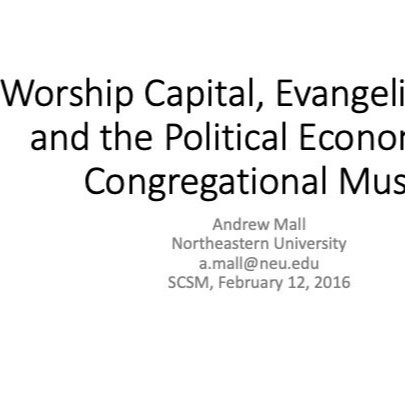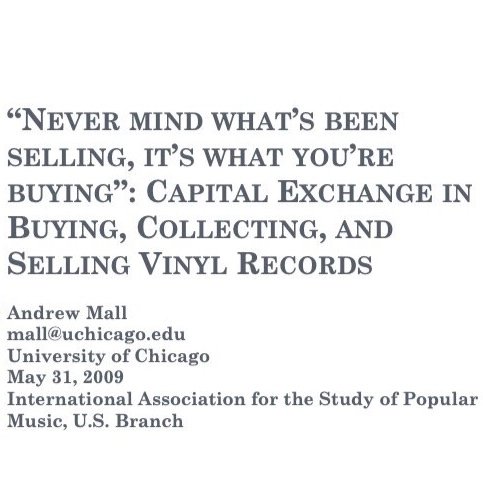
Studying Congregational Music: Chapter 7
Studying Congregational Music, Routledge (2021). Chapter 7, “Political Economy and Capital in Congregational Music Studies: Commodities, Worshipers, and Worship,” by Andrew Mall.

Worship Capital: On the Political Economy of Worship Music
American Music (2018). Scholars and scholar-practitioners from a wide variety of disciplinary and faith backgrounds have enriched our understandings of the ways in which music functions in worship contexts around the world. Yet, the political economy of worship music remains underexamined and undertheorized. In this article, I develop the theory of ‘worship capital’ as a corrective.
The Ethnomusicology of Religion: Fieldwork Methods and Ethics
SEM conference roundtable panelist (2017). Ethnographic fieldwork is often shaped by logistical issues including access, documentation, rapport, and fluency (both cultural and linguistic). Ethnomusicologists researching musics within religious or sacred contexts, however, face additional challenges. For example, moments of spiritual transcendence complicate participant-observation, both for ethnographers who belong to the faith tradition they are researching and for those who do not. Similarly, the varied expectations of the researcher’s audiences problematize documentation and representation. In this roundtable, participants consider these and other issues, addressing the ethical and methodological challenges of fieldwork posed by the ethnomusicology of religion.

Worship Capital, Evangelicalism, and the Political Economy of Congregational Music
SCSM conference presentation (2016). Building upon the works of Pierre Bourdieu, analyses of music industries, and contemporary discourses of intellectual property, this paper outlines a theoretical framework for the political economy of worship music and considers barriers to integrating this framework into our scholarship and practice. This research emerges from several years of ethnographic fieldwork at the Anchor Fellowship, a non-denominational evangelical church in Nashville, Tennessee, and advances the concept of “worship capital” to capture the various ways in which individuals and institutions invest in worship.

Studying Worship Capital: Cultural Insiderness, Religious Outsiderness, and Political Economy in Evangelical Worship
Yale ISM Fellows’ Lunch presentation (2015). The presence of capital in Christian worship is unmistakable, enabling individuals and institutions to participate in the production, distribution, mediation, and consumption of worship music. Performing artists, songwriters, and ministers operate in markets that shape the aesthetics of songs that congregations sing every Sunday morning. This worship economy, however, remains undertheorized in congregational music studies.

Capital, Class, and Congregational Matters: The Political Economy of Worship Music
Christian Congregational Music conference presentation (2015). Building upon the works of Pierre Bourdieu (1984, 1986, 1993), Jacques Attali (1985), and contemporary discourses of intellectual property, how might we consider the ways in which other forms of capital (cultural, intellectual, religious, social, etc.) are implicated in these markets? How do markets mediate between distinct congregations and globalized worship industries? This paper outlines a theoretical framework for the political economy of worship music, considering the roles of capital(s) in its production, distribution, mediation, and consumption.

“Never Mind What’s Been Selling, It’s What You’re Buying”: Capital Exchange in Buying, Collecting, and Selling Vinyl Records
IASPM-US conference presentation (2009). Who holds the upper hand at record fairs? The dealers sell the commodities, yes, but the collectors decide what to buy, from whom, and (often, via bargaining) for what price. While dealers frequently self-identify as collectors, interactions between dealers and collectors necessarily rely upon the commodity status of music recordings and their role in the exchange of economic, cultural, and social capital. Through ethnographic research at Chicago-area record fairs, I explore the tensions between record dealers and record collectors, and investigate the ways in which capital and exchange contribute to musical meaning.
Search and navigate extras
- 1A
- AAR
- Agence France-Presse
- AMS
- Amy Grant
- ARSC
- awards
- Baylor University
- Beer & Hymns
- Beyonce
- BFE
- Birmingham
- Boston
- Cambridge
- capital
- CCM
- CCMC
- Chicago
- Christian rock
- Christianity Today
- CNBC
- community
- congregational music
- crossover
- DePaul University
- discography
- DIY music
- documentaries
- emo
- Entertainment Weekly
- ethics
- festivals
- Fleetwood Mac
- Forum Daily News
- Furnace Fest
- Future of Pop
- Fyre Fest
- gamelan
- God Rock Inc
- hardcore
- IASPM
- IASPM-US
- introductions
- Keith Green
- Larry Norman
- Las Vegas
- Lindsey Buckingham
- Live Nation
- MEIEA
- mental health
- methods
- Michael Tait
- MIDSEM
- Money 4 Nothing
- music industries
- Nashville
- New England Conservatory
- Newsweek
- Northeastern Global News
- Northeastern University
- Nylon
- Oasis
- Ottawa
- panels
- Philadelphia
- podcast
- Pop Con
- Portland Press Herald
- punk
- radio
- record labels
- Rock Hall
- Rock That Doesn't Roll
- SAM
- San Antonio
- scene
- SCM
- SCSM
- SEM
- sing-alongs
- SMT
- Spotify
- Stevie Nicks
- streaming
- subculture
- Super Bowl
- Taylor Swift
- television
- Ticketmaster
- TicketNews
- TikTok
- TIME
- Tufts University
- Universal Music Group
- University of Chicago
- University of Pennsylvania
- vinyl
- Washington Post
- Whitney Houston
- worship
archives
- October 2025 1
- September 2025 3
- August 2025 3
- July 2025 3
- June 2025 2
- May 2025 8
- April 2025 4
- March 2025 1
- February 2025 3
- January 2025 1
- December 2024 4
- November 2024 2
- October 2024 1
- September 2024 1
- August 2024 3
- June 2024 3
- May 2024 1
- April 2024 5
- March 2024 2
- February 2024 6
- January 2024 1
- December 2023 4
- November 2023 2
- October 2023 4
- September 2023 1
- August 2023 1
- July 2023 1
- May 2023 1
- April 2023 2
- December 2022 2
- November 2022 1
- October 2022 3
- September 2022 3
- August 2022 1
- May 2022 1
- April 2022 1
- March 2022 2
- January 2022 1
- November 2021 1
- October 2021 3
- September 2021 3
- August 2021 2
- July 2021 3
- June 2021 2
- May 2021 6
- April 2021 11
- March 2021 2
- February 2021 2
- January 2021 2
- December 2020 1
- November 2020 3
- October 2020 1
- September 2020 1
- July 2020 1
- March 2020 1
- February 2020 3
- January 2020 1
- December 2019 1
- November 2019 4
- October 2019 1
- August 2019 1
- July 2019 1
- June 2019 1
- May 2019 1
- April 2019 1
- March 2019 4
- January 2019 2
- December 2018 1
- November 2018 1
- October 2018 2
- September 2018 1
- May 2018 1
- March 2018 3
- December 2017 1
- November 2017 2
- October 2017 1
- September 2017 2
- May 2017 1
- March 2017 1
- February 2017 1
- December 2016 2
- September 2016 1
- May 2016 1
- March 2016 1
- February 2016 1
- December 2015 1
- November 2015 2
- August 2015 2
- April 2015 1
- March 2015 2
- November 2014 1
- September 2014 1
- May 2014 1
- April 2014 1
- January 2014 1
- November 2013 1
- October 2013 2
- August 2013 1
- June 2013 1
- March 2013 1
- November 2012 1
- August 2012 1
- May 2012 2
- April 2012 1
- March 2012 1
- January 2012 1
- November 2011 1
- May 2011 1
- March 2011 1
- January 2011 1
- November 2010 1
- April 2010 1
- November 2009 1
- May 2009 2
- April 2009 1
- October 2008 1
- April 2007 1
- November 2006 1
- May 2006 1
- April 2006 1